2024届高三英语一轮复习状语从句专题讲解课件(共17张PPT)
文档属性
| 名称 | 2024届高三英语一轮复习状语从句专题讲解课件(共17张PPT) |  | |
| 格式 | pptx | ||
| 文件大小 | 496.2KB | ||
| 资源类型 | 教案 | ||
| 版本资源 | 通用版 | ||
| 科目 | 英语 | ||
| 更新时间 | 2023-10-30 10:49:46 | ||
图片预览

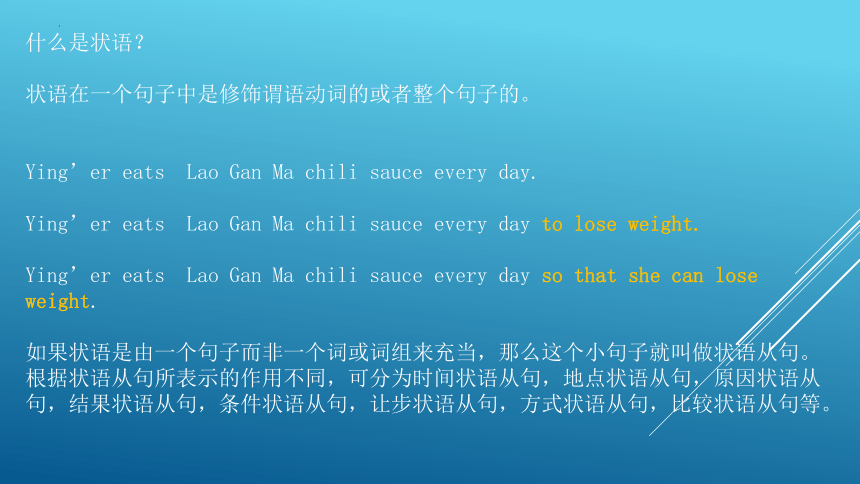
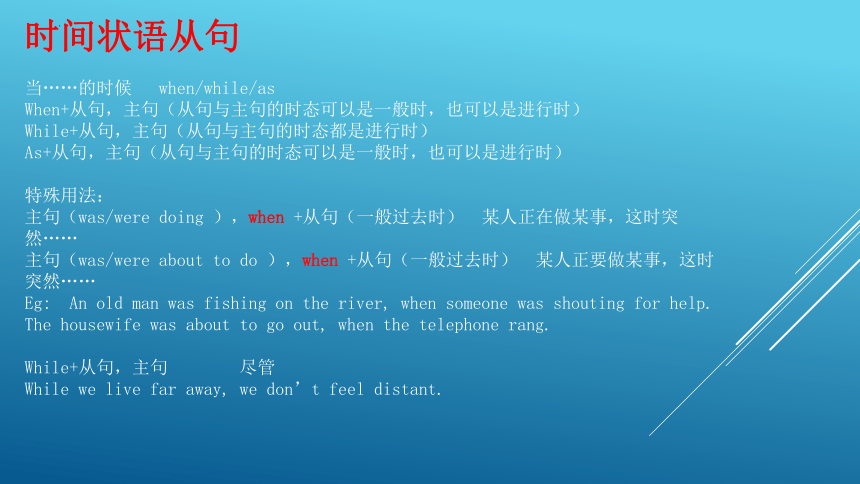
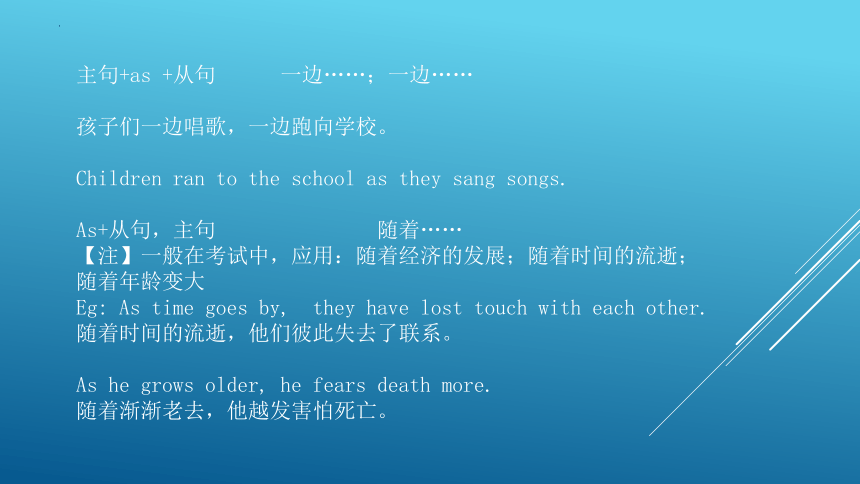
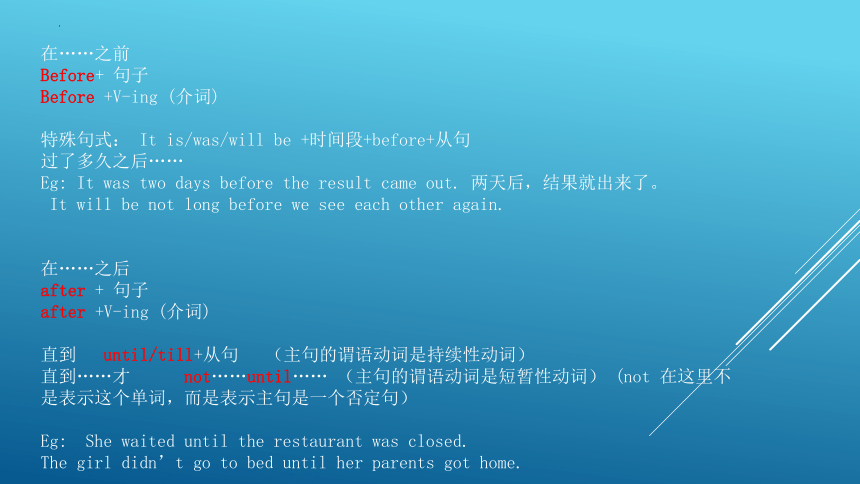
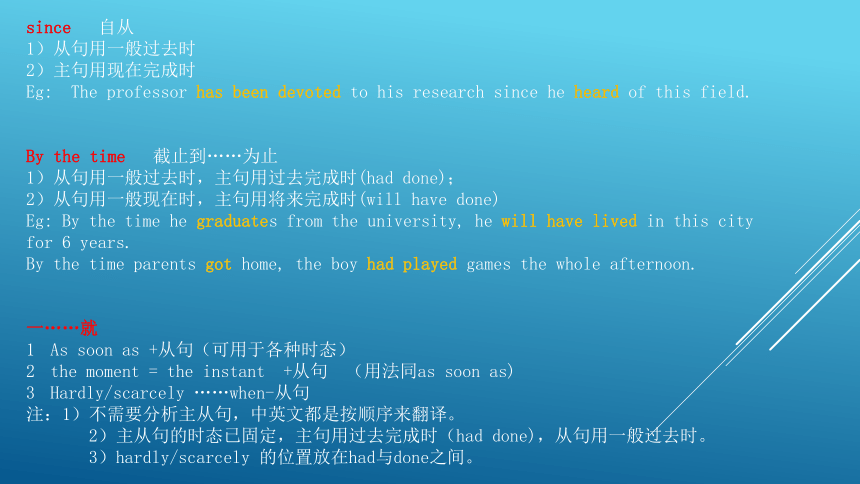
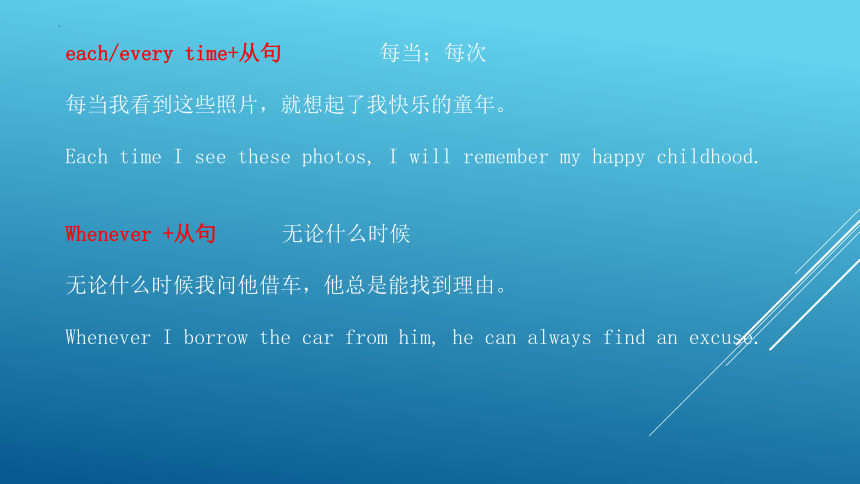
文档简介
(共17张PPT)
状语从句专题讲解
什么是状语?
状语在一个句子中是修饰谓语动词的或者整个句子的。
Ying’er eats Lao Gan Ma chili sauce every day.
Ying’er eats Lao Gan Ma chili sauce every day to lose weight.
Ying’er eats Lao Gan Ma chili sauce every day so that she can lose weight.
如果状语是由一个句子而非一个词或词组来充当,那么这个小句子就叫做状语从句。
根据状语从句所表示的作用不同,可分为时间状语从句,地点状语从句,原因状语从句,结果状语从句,条件状语从句,让步状语从句,方式状语从句,比较状语从句等。
时间状语从句
当……的时候 when/while/as
When+从句,主句(从句与主句的时态可以是一般时,也可以是进行时)
While+从句,主句(从句与主句的时态都是进行时)
As+从句,主句(从句与主句的时态可以是一般时,也可以是进行时)
特殊用法:
主句(was/were doing ),when +从句(一般过去时) 某人正在做某事,这时突然……
主句(was/were about to do ),when +从句(一般过去时) 某人正要做某事,这时突然……
Eg: An old man was fishing on the river, when someone was shouting for help.
The housewife was about to go out, when the telephone rang.
While+从句,主句 尽管
While we live far away, we don’t feel distant.
主句+as +从句 一边……;一边……
孩子们一边唱歌,一边跑向学校。
Children ran to the school as they sang songs.
As+从句,主句 随着……
【注】一般在考试中,应用:随着经济的发展;随着时间的流逝;
随着年龄变大
Eg: As time goes by, they have lost touch with each other.
随着时间的流逝,他们彼此失去了联系。
As he grows older, he fears death more.
随着渐渐老去,他越发害怕死亡。
在……之前
Before+ 句子
Before +V-ing (介词)
特殊句式: It is/was/will be +时间段+before+从句
过了多久之后……
Eg: It was two days before the result came out. 两天后,结果就出来了。
It will be not long before we see each other again.
在……之后
after + 句子
after +V-ing (介词)
直到 until/till+从句 (主句的谓语动词是持续性动词)
直到……才 not……until…… (主句的谓语动词是短暂性动词) (not 在这里不是表示这个单词,而是表示主句是一个否定句)
Eg: She waited until the restaurant was closed.
The girl didn’t go to bed until her parents got home.
since 自从
1)从句用一般过去时
2)主句用现在完成时
Eg: The professor has been devoted to his research since he heard of this field.
By the time 截止到……为止
1)从句用一般过去时,主句用过去完成时(had done);
2)从句用一般现在时,主句用将来完成时(will have done)
Eg: By the time he graduates from the university, he will have lived in this city for 6 years.
By the time parents got home, the boy had played games the whole afternoon.
一……就
As soon as +从句(可用于各种时态)
the moment = the instant +从句 (用法同as soon as)
Hardly/scarcely ……when-从句
注:1)不需要分析主从句,中英文都是按顺序来翻译。
2)主从句的时态已固定,主句用过去完成时(had done),从句用一般过去时。
3)hardly/scarcely 的位置放在had与done之间。
原因状语从句
Because+从句
Because of +名词(短语)
Eg: The driver caused an accident because of his carelessness.
The driver caused an accident because he was careless.
each/every time+从句 每当;每次
每当我看到这些照片,就想起了我快乐的童年。
Each time I see these photos, I will remember my happy childhood.
Whenever +从句 无论什么时候
无论什么时候我问他借车,他总是能找到理由。
Whenever I borrow the car from him, he can always find an excuse.
地点状语从句
在哪;到哪 where
Eg: You can go where you want to go.
无论在哪儿 ;无论到哪儿 wherever
无论到哪旅游,她都喜欢发朋友圈。Whenever she travels, she likes sharing photos into WeChat Moments.
原因状语从句
Because+从句
Because of +名词(短语)
Eg: The driver caused an accident because of his carelessness.
The driver caused an accident because he was careless.
拓展:because of = owing to = due to
= as a result/consequence of
既然:since+从句 = now that+从句
Eg: Since everyone has arrived, we start our meeting.
由于:as+从句
Eg: She is worried as her children haven’t got home.
主句,for+从句 因为……(不一定是真正的原因,主要是起补充说明的作用)
Eg: It must have rained yesterday, for the gound was wet.
条件状语从句
如果:if
If从句如果能改写为祈使句,则:
If 从句,主句 = 祈使句,and+主句 ……就……
Eg: if you work hard, you’ll pass the exam.
= Work hard, and you’ll pass the exam.
除非:unless
unless从句如果能改写为祈使句,则:
unless从句,主句 = 祈使句,or+主句 ……否则……
Eg: Unless you work hard, you won’t pass the exam.
= Work hard, or you won’t pass the exam.
只要:as/so long as
Eg: As long as we don’t lose heart, we will succeed someday.
以防万一;以免 in case+从句 (从句中用情态动词或一般现在时)
in case of +名词(短语)
Eg: You had better take an umbrella in case it rains.
You had better take an umbrella in case of the heavy rain.
一旦:once
Eg: Once you understand the rule, you will feel it so easy.
一旦理解了这个规则,你会发觉这很容易。
目的状语从句
为了;以便于
in order that = so that +从句
in order to = so as to +V-原
Eg: She runs every day in order that she can lose weight .
She runs every day in order to lose weight .
结果状语从句
so+adj./adv+that-从句 如此……以致于……
such+n./n.短语+that-从句
So+many/much/few/little +名词 +that-从句
Eg: He is so young a boy that he can’t go to school.
He is such a young boy that he can’t go to school.
让步状语从句
although = though 虽然……但是……;即使……
【注】although/though 与but不能同时使用。
尽管我很帅,但我不以此傲娇。
Although I am handsome, I am not proud of my beauty.
尽管他是一个小孩子,但他懂得小孩子的权利。
Although he is a child, he knows children’s rights.
Child as he is, he knows children’s rights.
Although/though 的强调句:把从句中被强调的部分放到句首(如果被强调部分是名词,名词前的冠词要省略掉,然后把although/though 换成as, 其他不变。)
Even if = even though 即使……(语气比though/although 更强)
恃靓行凶
无论……(注:从句无论放在前面还是后面,与主句用逗号隔开)
Whoever= no matter who 无论谁(从句中做主语)
Whomever = no matter whom 无论谁(从句中做宾语)
Whatever(+n.) = no matter what 无论什么(东西)
Whichever(+n.) = no matter which 无论哪一个(人或物)
Whenever = no matter when 无论什么时候
Wherever = no matter where 无论在哪
However (+adj./adv.)= no matter how 无论怎么样(……)
无论我们恨谁,都不应该伤害他。
无论她嫁给了谁,可能都将后悔。
无论你买了什么,都被允许在七日内退货。
无论她送给他什么礼物,他都会很开心。
无论什么时候孩子们去徒步旅行,都很兴奋。
无论在哪捡到钱,都应该交给警察。
无论我们怎么样劝她,她都没有改变想法。
无论雨下得多么大,工人们没有停止工作。
方式状语从句
as 按照;像……一样
学生们正按照老师告诉地那样做着实验。
Just as 正如(一般放在句首)
正如报纸上报道的那样,越来越多的中国学生选择出国留学。
as if = as though 好像;仿佛
(如果与事实一致,则用陈述语气;如果与事实不一致,则用虚拟语气)
这几个刚认识的外国人正在愉快地聊天好像他们是老朋友了。
天空布满了乌云,好像要下雨了。
比较状语从句
A与B一样的……
A+be+as+adj.+as+B
A+谓语动词+as+adv.+as+B
这个尺子跟这支笔一样长。
这只鸟跟那个飞机飞得一样高。
A比B更……
A+be+ adj.比较级+than+B
A+谓语动词+ adv.比较级+than+B
他的电脑比她的贵。
Tom比Jim学习更努力。
A 最……
A+be+the+ adj.最高级
A+谓语动词+ adv.最高级
鲸是世界上最大的野生动物。
鲸是所有野生动物中最大的。
倍数表达法
1)A+be+倍数+as+adj.+as+B A是B的几倍
2) A+be+倍数+the+n.+of+B
long ----- length large/big ----size high/tall ----height
wide----width heavy----weight old-----age
这个男孩的叔叔是他的三倍大。
A+be+倍数+ adj.比较级+than+B A比B大几倍
我的房间比她的大两倍。
比较级and比较级 越来越……
这个猫越来越肥了。
她说话越来越直接了。
越……,就越……
The +adj./adv.比较级+(主+谓),The +adj./adv.比较级+(主+谓).
越多,越好。
过马路越小心,行人就越安全。
状语从句专题讲解
什么是状语?
状语在一个句子中是修饰谓语动词的或者整个句子的。
Ying’er eats Lao Gan Ma chili sauce every day.
Ying’er eats Lao Gan Ma chili sauce every day to lose weight.
Ying’er eats Lao Gan Ma chili sauce every day so that she can lose weight.
如果状语是由一个句子而非一个词或词组来充当,那么这个小句子就叫做状语从句。
根据状语从句所表示的作用不同,可分为时间状语从句,地点状语从句,原因状语从句,结果状语从句,条件状语从句,让步状语从句,方式状语从句,比较状语从句等。
时间状语从句
当……的时候 when/while/as
When+从句,主句(从句与主句的时态可以是一般时,也可以是进行时)
While+从句,主句(从句与主句的时态都是进行时)
As+从句,主句(从句与主句的时态可以是一般时,也可以是进行时)
特殊用法:
主句(was/were doing ),when +从句(一般过去时) 某人正在做某事,这时突然……
主句(was/were about to do ),when +从句(一般过去时) 某人正要做某事,这时突然……
Eg: An old man was fishing on the river, when someone was shouting for help.
The housewife was about to go out, when the telephone rang.
While+从句,主句 尽管
While we live far away, we don’t feel distant.
主句+as +从句 一边……;一边……
孩子们一边唱歌,一边跑向学校。
Children ran to the school as they sang songs.
As+从句,主句 随着……
【注】一般在考试中,应用:随着经济的发展;随着时间的流逝;
随着年龄变大
Eg: As time goes by, they have lost touch with each other.
随着时间的流逝,他们彼此失去了联系。
As he grows older, he fears death more.
随着渐渐老去,他越发害怕死亡。
在……之前
Before+ 句子
Before +V-ing (介词)
特殊句式: It is/was/will be +时间段+before+从句
过了多久之后……
Eg: It was two days before the result came out. 两天后,结果就出来了。
It will be not long before we see each other again.
在……之后
after + 句子
after +V-ing (介词)
直到 until/till+从句 (主句的谓语动词是持续性动词)
直到……才 not……until…… (主句的谓语动词是短暂性动词) (not 在这里不是表示这个单词,而是表示主句是一个否定句)
Eg: She waited until the restaurant was closed.
The girl didn’t go to bed until her parents got home.
since 自从
1)从句用一般过去时
2)主句用现在完成时
Eg: The professor has been devoted to his research since he heard of this field.
By the time 截止到……为止
1)从句用一般过去时,主句用过去完成时(had done);
2)从句用一般现在时,主句用将来完成时(will have done)
Eg: By the time he graduates from the university, he will have lived in this city for 6 years.
By the time parents got home, the boy had played games the whole afternoon.
一……就
As soon as +从句(可用于各种时态)
the moment = the instant +从句 (用法同as soon as)
Hardly/scarcely ……when-从句
注:1)不需要分析主从句,中英文都是按顺序来翻译。
2)主从句的时态已固定,主句用过去完成时(had done),从句用一般过去时。
3)hardly/scarcely 的位置放在had与done之间。
原因状语从句
Because+从句
Because of +名词(短语)
Eg: The driver caused an accident because of his carelessness.
The driver caused an accident because he was careless.
each/every time+从句 每当;每次
每当我看到这些照片,就想起了我快乐的童年。
Each time I see these photos, I will remember my happy childhood.
Whenever +从句 无论什么时候
无论什么时候我问他借车,他总是能找到理由。
Whenever I borrow the car from him, he can always find an excuse.
地点状语从句
在哪;到哪 where
Eg: You can go where you want to go.
无论在哪儿 ;无论到哪儿 wherever
无论到哪旅游,她都喜欢发朋友圈。Whenever she travels, she likes sharing photos into WeChat Moments.
原因状语从句
Because+从句
Because of +名词(短语)
Eg: The driver caused an accident because of his carelessness.
The driver caused an accident because he was careless.
拓展:because of = owing to = due to
= as a result/consequence of
既然:since+从句 = now that+从句
Eg: Since everyone has arrived, we start our meeting.
由于:as+从句
Eg: She is worried as her children haven’t got home.
主句,for+从句 因为……(不一定是真正的原因,主要是起补充说明的作用)
Eg: It must have rained yesterday, for the gound was wet.
条件状语从句
如果:if
If从句如果能改写为祈使句,则:
If 从句,主句 = 祈使句,and+主句 ……就……
Eg: if you work hard, you’ll pass the exam.
= Work hard, and you’ll pass the exam.
除非:unless
unless从句如果能改写为祈使句,则:
unless从句,主句 = 祈使句,or+主句 ……否则……
Eg: Unless you work hard, you won’t pass the exam.
= Work hard, or you won’t pass the exam.
只要:as/so long as
Eg: As long as we don’t lose heart, we will succeed someday.
以防万一;以免 in case+从句 (从句中用情态动词或一般现在时)
in case of +名词(短语)
Eg: You had better take an umbrella in case it rains.
You had better take an umbrella in case of the heavy rain.
一旦:once
Eg: Once you understand the rule, you will feel it so easy.
一旦理解了这个规则,你会发觉这很容易。
目的状语从句
为了;以便于
in order that = so that +从句
in order to = so as to +V-原
Eg: She runs every day in order that she can lose weight .
She runs every day in order to lose weight .
结果状语从句
so+adj./adv+that-从句 如此……以致于……
such+n./n.短语+that-从句
So+many/much/few/little +名词 +that-从句
Eg: He is so young a boy that he can’t go to school.
He is such a young boy that he can’t go to school.
让步状语从句
although = though 虽然……但是……;即使……
【注】although/though 与but不能同时使用。
尽管我很帅,但我不以此傲娇。
Although I am handsome, I am not proud of my beauty.
尽管他是一个小孩子,但他懂得小孩子的权利。
Although he is a child, he knows children’s rights.
Child as he is, he knows children’s rights.
Although/though 的强调句:把从句中被强调的部分放到句首(如果被强调部分是名词,名词前的冠词要省略掉,然后把although/though 换成as, 其他不变。)
Even if = even though 即使……(语气比though/although 更强)
恃靓行凶
无论……(注:从句无论放在前面还是后面,与主句用逗号隔开)
Whoever= no matter who 无论谁(从句中做主语)
Whomever = no matter whom 无论谁(从句中做宾语)
Whatever(+n.) = no matter what 无论什么(东西)
Whichever(+n.) = no matter which 无论哪一个(人或物)
Whenever = no matter when 无论什么时候
Wherever = no matter where 无论在哪
However (+adj./adv.)= no matter how 无论怎么样(……)
无论我们恨谁,都不应该伤害他。
无论她嫁给了谁,可能都将后悔。
无论你买了什么,都被允许在七日内退货。
无论她送给他什么礼物,他都会很开心。
无论什么时候孩子们去徒步旅行,都很兴奋。
无论在哪捡到钱,都应该交给警察。
无论我们怎么样劝她,她都没有改变想法。
无论雨下得多么大,工人们没有停止工作。
方式状语从句
as 按照;像……一样
学生们正按照老师告诉地那样做着实验。
Just as 正如(一般放在句首)
正如报纸上报道的那样,越来越多的中国学生选择出国留学。
as if = as though 好像;仿佛
(如果与事实一致,则用陈述语气;如果与事实不一致,则用虚拟语气)
这几个刚认识的外国人正在愉快地聊天好像他们是老朋友了。
天空布满了乌云,好像要下雨了。
比较状语从句
A与B一样的……
A+be+as+adj.+as+B
A+谓语动词+as+adv.+as+B
这个尺子跟这支笔一样长。
这只鸟跟那个飞机飞得一样高。
A比B更……
A+be+ adj.比较级+than+B
A+谓语动词+ adv.比较级+than+B
他的电脑比她的贵。
Tom比Jim学习更努力。
A 最……
A+be+the+ adj.最高级
A+谓语动词+ adv.最高级
鲸是世界上最大的野生动物。
鲸是所有野生动物中最大的。
倍数表达法
1)A+be+倍数+as+adj.+as+B A是B的几倍
2) A+be+倍数+the+n.+of+B
long ----- length large/big ----size high/tall ----height
wide----width heavy----weight old-----age
这个男孩的叔叔是他的三倍大。
A+be+倍数+ adj.比较级+than+B A比B大几倍
我的房间比她的大两倍。
比较级and比较级 越来越……
这个猫越来越肥了。
她说话越来越直接了。
越……,就越……
The +adj./adv.比较级+(主+谓),The +adj./adv.比较级+(主+谓).
越多,越好。
过马路越小心,行人就越安全。
